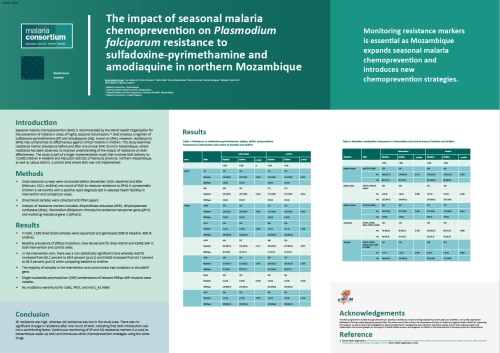
Publication Date:
20/10/2023
Author:
Sonia Maria Enosse
Ivan Alejandro Pulido Tarquino
Pedro Aide
Gloria Matambisso
Wilson Simone
Maria Rodrigues
Kevin Baker
Craig Bonnington
Type:
Poster

The impact of seasonal malaria chemoprevention on Plasmodium falciparum resistance to sulfadoxine-pyrimethamine and amodiaquine in northern Mozambique
Publication Date:20/10/2023
Author:
Sonia Maria Enosse
Ivan Alejandro Pulido Tarquino
Pedro Aide
Gloria Matambisso
Wilson Simone
Maria Rodrigues
Kevin Baker
Craig Bonnington
Type:
Poster
Monitoring resistance markers is essential as Mozambique expands seasonal malaria chemoprevention and introduces new chemoprevention strategies.
Seasonal malaria chemoprevention (SMC) is recommended by the World Health Organization for the prevention of malaria in areas of highly seasonal transmission. SMC employs a regimen of sulfadoxine-pyrimethamine (SP) and amodiaquine (AQ), known as SPAQ. However, resistance to SPAQ may compromise its effectiveness against clinical malaria in children. This study examines resistance marker prevalence before and after one annual SMC round in Mozambique, where resistance has been observed, to improve understanding of the impact of resistance on SMC effectiveness. The study is part of a larger implementation study that involved SMC delivery to 72,000 children in Malema and Mecubúri districts of Nampula province, northern Mozambique, as well as Lalaua district, a control area where SMC was not implemented.
This poster was presented at the 72nd annual meeting of the American Society of Tropical Medicine and Hygiene.
Country: Mozambique
Keywords: ASTMH | Chemoprevention | Community delivery | SMC
« Back to Publications